Peter MALONE
Saturday, 18 September 2021 19:21
Out West With the Hardys
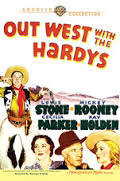
OUT WEST WITH THE HARDYS
US, 1938, 90 minutes, Black and white.
Lewis Stone, Fay Holden, Mickey Rooney, Cecilia Parker, Sara Haden.
Directed by George B. Seitz.
Out West with the Hardys is one of the earliest of the Hardy series. It starts, as usual, with the judge in court and with a problem about property and water resources. Mother is spring-cleaning - but the whole family goes out west. Once again Marian becomes infatuated, Andy has problems with a little girl and her ability to ride a horse and shoot (Virginia Weidler attractive in this role), the judge and mother get embroiled in the problems of their hosts, Aunt Milly is there for back-up. Polly Benedict also appears at the beginning and end. By this time, the formula was well developed - and responding to the acclaim by the American public. (Of historical interest, Mickey Rooney has some rather racist lines which would have been taken for granted at the time - his exultation when they were able to sell the property, `Another redskin bites the dust,' and a comment about Polly's friend and his being `a white man'.)
1.The popularity of the Hardy series? The developing tradition and formulas? The ideal American family of the '30s? This film within the series?
2.Production values, B-budget, the stars, the sets - and the western setting? Musical score?
3.The title - and expectations of the west?
4.The judge, in action in court, the story of the flirtation with Dora, going home, wanting to help the Northcotes? The tense meal, mother and her spring-cleaning? Going west, the isolation, welcomed at the ranch? The judge and his advice, the discussions with mother about buying the land? The owner thwarting them, in collusion with the Indian? The judge and his wise advice for Marian to help with the housework, for Andy to try to get along without rules and supervision? The children learning their lesson? The return, the continuing joke about the Indian blanket, mother providing the solution for the difficulty? The saving phone call? The judge and mother as the ideal parents?
5.Marian, the fight with Dennis, the flirtation with Ray, trying to do the housework, the breakfast, boiling the boots, scrubbing the floor with molasses - and Jake hostile to her? Her discovery of the truth about herself? Reconciliation with Dennis?
6.Andy, the 16-year-old, basketball success, the clash with Polly Benedict? Writing to her? Out west, the clothes, imitating the cowboys? The bet and riding the horse and falling off? The friendship and clash with Jake? The bet about her shooting and her winning the dollar? His grief about her horse? Getting the vet? Borrowing the money? Lost and Jake finding him? The apology to Polly Benedict, his father's advice about the contract?
7.Ray, the widower, his story, attracted to Marian? The attempt at housekeeping and the boiling of the boots? Jake, the story of her birth, like a little boy, ability to ride, shoot? Finding Andy - and telling the story to save him? Her grief about the horse?
8.The Northcotes, old friends, the ranch, their neighbour and the deals, the water? The blanket with the map? The law and their being saved?
9.The familiar ingredients - in their time, in retrospect?
Published in Movie Reviews
Published in
Movie Reviews
Tagged under
Saturday, 18 September 2021 19:21
Her Desperate Choice
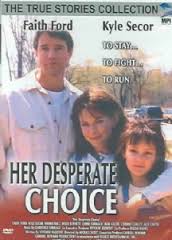
HER DESPERATE CHOICE
US, 1996, 100 minutes, Colour.
Faith Ford, Kyle Secor.
Directed by Michael Scott.
Her desperate choice is an American telemovie about a father who has molested his daughter, and the wife who has abducted her from a state organisation. Mother and daughter go on the run and are supported by an underground for abused families. The film shows the plight of the mother and daughter, their ability to cope, the support that they receive, support from a genial vet whom the mother eventually marries.
Faith Ford is best known for her performance as the daffy reporter in Murphy Brown. Kyle Secor has played a number of villains, but here he is the nicest of nice people.
The film packs an emotional impact and illustrates a theme of the '90s, molestation of children as well as broken families.
1. Impact of the telemovie? Emotional issues? For the home audience?
2. A film of the American road, the various states, towns, homes, shops? An authentic atmosphere?
3. The title, the focus on Jody and what happened in her life, her care for her daughter? Taking her on the road? The role of the law?
4. The central situation: the mother concerned with the daughter, the daughter and the molestation, her fear of her father, her fear of men? The physical abuse? Illness? The going on the run - despite the court order? The father and his pursuit of his daughter by means of the private investigator?
5. Jody, an ordinary woman, her career, marriage, divorce? Love of her daughter, taking her from the institution, going to her mother and friends? The doctor and the physical abuse? The warning and her going on the road? The refuge? The underground and the phone call from Grace? On the road and the various families helping, the black woman, the Jewish family? Frank and his giving Jody a job? The encounter with Jim and his support? The passing of time and the impact on Jody? On Sammi?
6. Sammi and her experience of the molestation, love for her mother, on the road, fears, worry? With the various families? Finally settling? Frank giving her a job? Going to school? The outings with Jim? The crisis with the wanting to take fingerprints? The teacher's support? The marriage and happily settling?
7. Marcus, his denial of the abuse, his work, hiring the private detective, the passing of the years, the reports? The private detective, his attitude, skills?
8. Grace, the underground, the phone calls, the network and the support, her coming to the wedding?
9. Jim and his genial support of Jody? Falling in love? Seeing the poster? The outings, helping Jody to escape? Going to his house, the family, the wedding? Settling down?
10. The range of people who supported the underground: black families, Jewish, the police?
11. The final catching up of the FBI with Jody and the family? The arrests? The final information and their vindication?
12. The home audience and the emotional experience of this kind of crisis? Helping the audience to understand it better by the telling of the story and the emotional response?
Published in Movie Reviews
Published in
Movie Reviews
Tagged under
Saturday, 18 September 2021 19:21
Hercules Returns
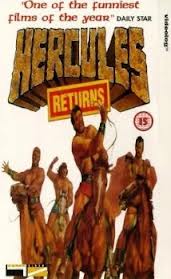
HERCULES RETURNS
Australia, 1993, 90 minutes, Colour.
David Argue, Bruce Spence, Michael Carmen.
Voices of Des Mangan, Sally Patience, Matthew King.
Directed by David Parker.
Hercules Returns is based on the stage performance Double Take Meet Hercules, spoken by Des Mangan and Sally Patience. Old films, especially Italian spectacles of the '60s, are taken and dubbed with a spoof story. Hercules, Samson, Ursis and Machiste, the Invincible, was directed by Giorgio Capatini in 1964. Even without the spoof dialogue supplied by the actors, the Italian spectacle seems fairly ridiculous, beefcake parades with sinister intrigues. However, with the substitution, Hercules becomes a pop star of ancient Greece looking for a gig. The humour is fairly basic, many touches of the teenage schoolboy humour about sexuality and bodily functions. However, they raise a laugh in their straightforward way.
David Parker (photographer and writer - Malcolm) directs his first feature film and puts a framing device where Sir Michael Kent, tycoon, wants to control all the cinemas in Melbourne, and film buff Brad with his friend Sprocket the projectionist, and publicist Lisa, have to dub the film because Kent has supplied them with an unsubtitled Italian print. David Argue, Bruce Spence and Mary Koustas give vigorous performances - especially with their voice-over. Michael Carmen is Sir Michael Kent. Local celebrities like Margaret Pomerantz and Ivan Hutchinson appear at the premiere of this reworked Hercules.
1.Old epics from Italy in the '60s, beefcake, exaggerated performances, the comic element - intended and unintended?
2.The skill at dubbing, the plot, the tough heroes, the ambiguities, the fights and romance? The language, the jokes, the level of the humour?
3.The situation: the movie complexes, Sir Michael Kent and his board meetings, Brad the film buff, the yes-men, Brad losing his job, renovating the theatre, getting Sprocket, Lisa and her help? The sabotage with the print? The group, their plan, the eccentric characters in themselves, at the theatre, their skill in dubbing, the happy ending?
5.The idea as a basis for parody - the one joke and its variations rather than subtle comedy?
Published in Movie Reviews
Published in
Movie Reviews
Tagged under
Saturday, 18 September 2021 19:21
Hellraiser 3: Hell on Earth
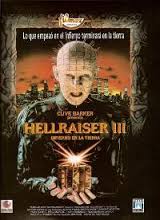
HELLRAISER 3: HELL ON EARTH
UK, 1992, 91 minutes, Colour.
Doug Bradley, Ashley Laurence.
Directed by Anthony Hickox.
Hellraiser 3: Hell on Earth, transfers the Hellraiser stories to the United States. While set in New York City, the film was made in North Carolina.
Author Clive Barker is the executive producer of the film. However, the screenplay was written by Peter Atkins. It takes up some of the themes from the earlier Hellraiser films as well as its basic theme of the box of evil. The film relies very much on its graphic special effects - in many cases in this film, pictures of quite savage killing. There is the confrontation between good and evil, strong in the screenplay (but hindered by a coarse language approach to what might have been otherwise an intelligent exploration of horror). There is some evil mockery of the Christian Eucharist and Christ-figures which highlight the incarnation of evil. The heroine is a television reporter, an intrepid heroine who has nightmares about her father, dead in Vietnam, and who gets the mission to save the world. The film was directed by Anthony Hickox (who can be quickly glimpsed in a collage of cable channel programs shown through the film).
1.The popularity of the Hellraiser films? Clive Barker as author, creator of horror characters, stories, themes? His contribution to the present film?
2.The transfer of the stories to the United States: the New York settings, the street, the club, apartments, television studios? The importance of the special effects and stunt work? Their graphic style? Intimations of evil, the diabolical? The musical score, the range of songs - and the contribution of groups with the touch of heavy metal style and lyrics?
3.The title, the character of the Hellraiser? The role of the Hellraiser in transforming people, consuming them, trying to incarnate evil? Struggle between good and evil?
4.Joanne, her work, hopes in the network? Her relationship with Doc? The poor program, the episode in the hospital, the death? The encounter with Terri? The request to follow the story, the visit to the club, the discussion with the owner, Terri's phone call, the discussion at the apartment, her hospitality, Terri staying the night, telling the information? The comedy with the breakfast? Joanne and her work, the phone call about the new job? Terri leaving? Joanne and her nightmares about her dead father, unable to save him? The recurring dreams? Terri and the box, the waking up in the night with the massacre on television? Her own dream, going through the wall, the message from the alien to save the world? The visit to the club, the dead bodies? Doc's death? The confrontation with the Hellraiser? The pursuit by Terri and J.P? The danger in the streets, the police, the explosions, the chains? The violent dreams, the Hellraiser entering her dreams and consciousness? Opening the box, absorbing the evil? The irony of her placing the box in the cement - and the building and its set design on the site? Intrepid heroine?
5.J.P., his buying of the statue, his club and its decor, his art? His killing his parents? His treatment of the women? The statue coming alive, the Hellraiser absorbing the girl? His deal with the Devil, inviting Terri? Her sacrificing him to the Hellraiser? His being possessed?
6.Terri, witnessing the death, her age and experience, the friendship of Joanne, giving her self-esteem, telling her the truth? The box? The phone call and her return to J.P.? Her sacrificing him? Her being transformed?
7.Doc, the personnel at the television station? His being killed? The transmission - without the machine being hooked up? The role of the media?
8.The people at the club, victims, the savagery and brutality of their deaths? The significance of 20 to 30 year-old adults being trapped in a club and murdered? Allegory for present evils in society and destruction of young adults?
9.The Hellraiser, his background, character? Absorbing people? The confrontation with J.P. and Terri, with Joanne? The brutality? The contrast with the military man in the dreams? His warnings to Joanne, commissioning her? The reappearance - and the Hellraiser entering the dreams and taking the shape of her father?
10.Religious themes, the visit to the church, the parody of the Stigmata and the Crucifixion, the parody of the Eucharist? The confrontation between good and evil? The priest and his saying that Hell and Devils were symbols? The reality?
11.The popularity of this kind of entertainment in the '80s and '90s? Plausible plots? Religious dimensions? Playing games with special effects and horror stories?
Published in Movie Reviews
Published in
Movie Reviews
Tagged under
Saturday, 18 September 2021 19:21
Hellraiser
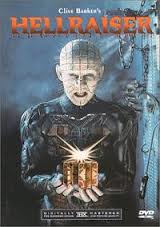
HELLRAISER
UK, 1987, 98 minutes, Colour.
Andy Robinson, Clare Higgins, Ashley Laurence.
Directed by Clive Barker.
Hellraiser is the work of author turned director Clive Barker. The film is based on his story, The Hellbound Heart.
The film is a striking example of British horror film-making - much more intense, even perverse, than some of the more popular, even over the top, American horror-making. The film relies on an extraordinary atmosphere of a family, tense relationships, personal corruption. It also offers a highly imaginative world as a puzzle box opened and a species of demon, the Cenobites, appear. They are grotesques - often repellent, often frightening. This mood continues throughout the film, becoming even stronger as the decent character is killed and is taken over by his degenerate brother.
The film has cult status because of its creativity in horror film-making. However, it is not the kind of film that your average audience might enjoy. There was a sequel, Hellbound: Hellraiser II, but was not directed by Barker.
1.Imaginative British horror? Plot, characters, imagination? The world created? Demons? Violence and horror? Struggles of good and evil?
2.British production values, the house, the ordinary life contrasting with the re-creation of the world of the Cenobites? Make-up and special effects? Editing and pace? Title?
3.The title and its various meanings, Frank Cotton as a degenerate hellraiser? The raising of the Cenobites from Hell?
4.The atmosphere of the opening: the bazaar, the Middle East, Frank and his adventures, the puzzle box, opening it up and the diabolical result? His return home, solving the puzzle, the encounter with the Cenobites, his wanting experience and pleasure? The torture, his destruction? His becoming diabolical? His appearing to Julia? His brother's blood enabling him to appear? The seduction of Julia? Picking up the wanderers to provide him with blood? His appearing to Kirsty, her taking the puzzle box? Frank and his demands? His wanting a skin - and his forcing Julia to murder Larry, Larry as Frank, diabolical? The threats to Kirsty? Frank and the death of Julia? His being destroyed again?
5.Kirsty as the heroine, her relationship with her father, with her stepmother? Her boyfriend? The suspicions of evil, in the house, her suspicion of her mother? Frank's appearance, her horror, taking the puzzle box? Her collapse, hospital? Her solving the puzzle, the visit by the Cenobites? Her promising to lead them to Frank? Her return to the house, the horror, her father - actually Frank? Showing her the remains? Her realisation of the truth? The confrontation with the Cenobites, Steve rescuing her from the house? The demon taking the box from the fire?
6.Julia, a character of evil? Her past relationship with Frank? Larry and his marriage, her fidelity and infidelity, her dominance? Relationship to Kirsty? Frank appearing to her, her seduction, her manner of luring the people back to the house, murdering them? Kirsty and the intervention with the victim? Julia and the death of Larry, giving Frank the skin? Her deceit with the disguised Frank? The confrontation and her death?
7.Larry, genial man, marriage to Julia, love for Kirsty? His becoming the victim of Frank and Julia? His death? The irony of the diabolical Frank with Larry's appearance? His confrontation with Kirsty, his death?
8.Steve, the relationship with Kirsty, sharing the adventures, in hospital, the final rescue?
9.The portrait of the derelicts, the various victims? Taken in by Julia and their deaths?
10.The characters of the Cenobites, the variety of their make-up, tortured images? The humorous irony with the clamps, wounds, dark glasses? The monster aspects?
11.Audience response to the special effects - the Cenobites, their cruel behaviour, their treatment of Frank, the skin, turning their victims inside out? Audience response to this kind of horror?
12.The popularity of the film? Its cult status?
Published in Movie Reviews
Published in
Movie Reviews
Tagged under
Saturday, 18 September 2021 19:21
Hell Hath No Fury
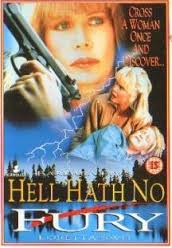
HELL HATH NO FURY
US, 1991, 85 minutes, Colour.
Barbara Eden, Loretta Swit.
Directed by Thomas J.Wright.
Hell Hath No Fury is the beginning of the quotation which finishes: `like a woman scorned'. This psychological thriller takes up the theme - seemingly in an implausible way, but, once the audience is hooked on the characters and the situation, carries it through with the courage of its convictions.
Loretta Swit gets her chance to portray a criminally insane and jealous woman. After murdering her boyfriend, she goes after her first boyfriend of 20 years earlier, now a successful furniture salesman and married to Barbara Eden and with a young daughter. Swit jealously murders him and tries to frame Barbara Eden. She then infiltrates herself into Eden's life, killing her best friend and attempting to kill her daughter.
While the plot sounds wildly melodramatic, it is presented in the popular telemovie style for the wide audience. Barbara Eden is expert at this kind of film. There are various twists, audiences identifying with the heroine as the unjustly accused woman. There is a particularly obnoxious detective who makes sure that audience sympathy is with Barbara Eden. Needless to say there is a melodramatic finale and a happy conclusion. Popular entertainment of its kind.
1.The popularity of this kind of psychological thriller telemovie? Relationships, families, success - and the dark side and echoes from the past?
2.The small town, families, shops, police precincts? The musical score?
3.The title and the quotation? Connie as a woman scorned? Her deadly vengeance?
4.Connie, her background - and the revelation that she had tried to kill her parents, injuring her mother, then not telling the truth to the police? Her memories of Nebraska, the relationship with Stanley, Terri taking Stanley from her? Her strange life, her boyfriend, the brutality - and her shooting him? The car, stalking Stanley and Terri? The confrontation with Stanley, the meal, making him write the note, shooting him? Her friendship with Terri, pretending her name was Nettie? The listening, the outings, the sympathy? The confrontation with Marlene and shooting her in the shop? Framing Terri? The finale with the phone call to Michelle, taking her from the airport, phoning Terri, the rendezvous, the violent confrontation and her madness? Terri defeating her? Going off in the ambulance?
5.Terri and her relationship with Stanley, his success as a salesman? The TV advertisements? Signing the documents - and the revelation of how much he had spent? Terri's life, the strain with Michelle? Michelle's love for her father? Friendship with Marlene, her work, getting the job? The shock of Stanley's death? The police and their investigations, accusations? The lawyer and the financial difficulties? The tension with Michelle? At work, friendship with Marlene - and Marlene's death? The arrest and the imprisonment? The encounter with the black woman in the cell? Getting out, standing on her own feet? The decision to find Connie? Meeting Nettie, the friendship and sympathy? The difficulties with Michelle, the airport, her frantic drive? The confrontation with Connie, the fight in the house? The police, the detective's apology? The reconciliation with her daughter - and managing the shop? The clash with Marlene's husband, his suspicions - and the reconciliation? A credible character - victim?
6.Stanley, his success, love for his family? Coming home, encountering Connie, the meal? Her terrorising him, his death? His leaving his family poor? Michelle, her love for her father, the reconciliation with her mother, the encounter with Connie?
7.Marlene and her husband, friendship, suspicions of the affair, the brutality of the murder? Connie and her malevolence?
8.The police, the detective with his mind made up, his callous treatment of Terri? The sympathetic detective? The police and their investigation of Connie's initial murder, the interrogations, following leads? The contact with the police and the solving of the case?
9.Popular ingredients for a melodramatic, psychological thriller? The dramatisation of criminal insanity?
Published in Movie Reviews
Published in
Movie Reviews
Tagged under
Saturday, 18 September 2021 19:21
Hellbound: Hellraiser II
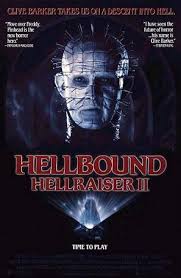
HELLBOUND: HELLRAISER II
UK, 1988, 86 minutes, Colour.
Ashley Laurence, Clare Higgins, Kenneth Cranham.
Directed by Tony Randel.
Hellbound: Hellraiser II is more of the same. While the story is very reminiscent of the original and comes from Clive Barker, Barker did not direct this film as he did with the original. There is a new screenwriter, Peter Atkins, and a new director, Tony Randel. However, the film has some success with its visualisation of the asylum, the Hell, the leviathan and the Cenobites. Sets and decor and special effects are quite striking in a grim way.
Some of the same stars reappear, especially Ashley Laurence as Kirsty, Claire Higgins as Julia and Sean Chapman as Frank. Kenneth Crennan appears as an eccentric Dr Channard.
Critical comment was not as favourable towards this film as with the original - though it very much resembles the original.
1.Impact of this sequel, more of the same? The adaptation of the original story?
2.The cult status of these films? Capitalising on audience interest in horror, fantasy? Evil and cruelty? Heroics? Extraordinary imagination for horror? Defying death and Hell?
3.Kirsty as an ordinary person yet caught up in the extraordinary asylum, the going into Hell? The landscapes of Hell? The special effects?
4.The title and the focus on Hell, a nightmare adventure into Hell and out again?
5.The recapitulation of the original film, supplying of information and characterisation, especially Kirsty, Julia and Frank?
6.Kirsty, the effect of the original story, finding herself in the asylum? Dr Channard and his regime? The friendship with Tiffany? Kyle and her searching the laboratory with him? His death? The opening up of Hell, the confrontation with Frank, murderous experiences, Julia saving her? The plea with the Cenobites and the asking of them to draw on their humanity? Kirsty rescuing Tiffany disguised as Julia? The final escape? The popular heroine for this kind of terror?
7.Dr Channard and the asylum, his victims, his thirst for knowledge, his using Tiffany to solve the puzzles? The death of Kyle? The details of the asylum and its eccentricity and horror? The encounter with Julia and her advances? Going into Hell with Julia? The leviathan and his being transformed grotesquely into a Cenobite?
8.Tiffany, mute, Dr Channard's victim? Solving the puzzles? Sharing the experiences with Kirsty? The final rescue?
9.Kyle and Dr Channard, his work, the search, his death?
10.Julia and the overtones of the original film, a woman of evil, her return? Advances to Dr Channard? Going into Hell, the confrontation with Frank, her enmity? Her destroying him? Kirsty using her skin to rescue Tiffany?
11.The Cenobites, the visual grotesque? Pinhead, his role in the drama, his memories of the colonial army in the '20s?
12.The leviathan, the giant puzzle, the nature of Hell? Pandora's box opening to evil?
13.Themes of fear, going beyond good and evil, the nature of Hell? Good and evil, heroics? The irony of the ending with more demonic forces emerging?
Published in Movie Reviews
Published in
Movie Reviews
Tagged under
Saturday, 18 September 2021 19:21
Helen Keller, The Miracle Continues
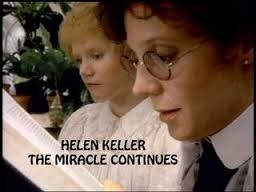
HELEN KELLER, THE MIRACLE CONTINUES
US, 1982, 100 minutes, Colour.
Blythe Danner, Mare Winningham, Perry King, Vera Miles, Peter Cushing, Alexander Knox, Jack Warden.
Directed by Alan Gibson.
Helen Keller, the Miracle Continues is a continuation of the Miracle Worker story. The Miracle Worker, with Anne Bancroft and Patty Duke, was a success in the early '60s. It was remade in the '80s with Patty Duke in the Annie Sullivan role and Melissa Gilbert as Helen Keller. The film was directed by Alan Gibson, who directs this sequel.
Blythe Danner is excellent as Annie Sullivan, a complicated character, devoted to Helen and unable to move away from Helen into a marriage. Mare Winningham is also excellent as Helen Keller. Perry King gets a very good role as the editor who works with Helen and falls in love with Annie Sullivan but is unable to make the marriage work. In the supporting cast are guest moments by Vera Miles, Peter Cushing and Alexander Knox. Jack Warden gives an impersonation of Mark Twain.
The film starts at the turn of the century, shows Helen's academic career at Radcliffe, the publication of her biography and her writings. It focuses also on the choice that was made for Annie Sullivan and Helen to go to the vaudeville theatre to show the world her message (pre-television days).
A moving piece of Americana.
1.Audience knowledge of Helen Keller and Annie Sullivan? Admiration, understanding? The miracle of Helen Keller's life? Her adult life?
2.The re-creation of the turn of the century in Massachusetts, lifestyle, education, publishing, social life, vaudeville? The atmosphere of the period? The musical score?
3.The strength of the cast and their portrayals of the characters?
4.Familiarity with the story, Helen Keller's life, her disabilities, gradual intellectual and emotional awakening, communication, education? Her awakening to the complexities of life?
5.Annie Sullivan and Helen: the strength of their relationship, Teacher? Communication and awareness? Annie Sullivan and her eyes, limited vision? Sharing with Helen, always with her? Mutual dependence? Helen's education, the clash with the educators? The support of Mrs Keller? The English professor and the suggestion about publishing? Helen and her writing, Johnny and his arrival, editing? Falling in love? Helen becoming aware of the relationship? The build-up to the marriage, the wedding ceremony? Yet Annie's devotion to Helen, feeling herself indispensable? The clashes with Johnny, her harshness, the separation? Her illness? Her protectiveness of Helen, wariness of her relationship with Peter, warning him off? The decision to go to the vaudeville theatre? Her introduction to Helen's speech? The achievement of Annie Sullivan - at what reward, at what cost?
6.Helen Keller in herself, her background, sensitivity, yearning for education, poetic skills, love of nature, warmth with people? Speaking when she trusted them? The bond with Annie Sullivan? Going to college, her fears? The friendship of the students? Socials, music and dancing? The friendship with Mark Twain, discussions with him, his advice? The lectures, English, writing her autobiography? The achievement of her graduation? Friendship with Johnny, working with him, attracted to him, learning of his love for Annie? The wedding? Discovery of her emotions? The friendship with Peter, outings with him, the plan to elope, her being left? Her grief? Her decision to go into vaudeville, her decision to speak openly? The quality of her final speech?
7.Johnny and his skills, entering the life of the two women, admiration for Helen, communicating with her, attracted by Annie, falling in love, marrying, their work, the fights, his feeling left out, unable to persuade Annie to be with him, his drinking, being ousted from their lives?
8.Mark Twain and his friendship, his reputation, admiration for Helen, advice?
9.The sketch of Helen's mother, her trust in Annie Sullivan, standing up for her at the college? Her pride in her daughter? Her loving her but not being close?
10.The background of colleges at the turn of the century, women students? The prestige for having Helen Keller? Not wanting Annie Sullivan? The English professor and his support of his writings?
11.Peter, falling in love with Helen, socialising, the plan, the strong warning by Annie and his disappearing?
12.The audience at the finale, their listening to Helen, their appreciation and standing ovation?
Published in Movie Reviews
Published in
Movie Reviews
Tagged under
Saturday, 18 September 2021 19:21
Heartbreakers
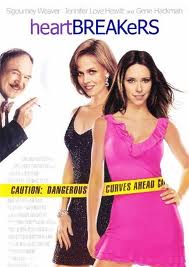
HEARTBREAKERS
USA, 2001, 124 minutes, Colour.
Sigourney Weaver, Jennifer Love Hewitt, Ray Liotta, Jason Lee, Gene Hackman, Anne Bancroft, Nora Dunn.
Directed by David Merkin.
Heartbreakers is an entertaining comedy, a focus on two women, a mother and daughter, and their ability as confidence tricksters. Sigourney Weaver in the mother. Jennifer Love Hewitt is the daughter. The film also focuses on the rivalry between the two women, trying to outdo each other in the confidence stakes.
The setting is Florida, the easy pickings amongst the men who have more money than sense. However, Jason Lee is a young man who genuinely falls in love with the daughter and precipitates a crisis.
However, the film is stolen in a cameo appearance by Gene Hackman as a smoking executive. If ever there was a comedy in somebody suffering (but enjoying it) the effects of smoking, it is Hackman in this performance. An entertaining light comedy.
1. A popular and light entertainment, romance, confidence fraud? An entertaining and humorous combination of both themes?
2. The title and its reference to Max and to Paige, their relationships, marriages, breaking up marriages? Their actually falling in love?
3. The New Jersey opening, the contrast with Florida, Palm Beach and its affluence, the water, mansions? The affluent setting for confidence tricks? The range of songs used in the background, the commentary of the songs on characters and actions? Musical score?
4. The opening with the wedding, Max and her devotion, Dean and his enthusiasm, the ceremony, the celebration afterwards, the dancing together, Max dancing with all and sundry, Dean weary? The wedding night, her going to sleep? The next morning, Dean sitting there, waiting, Max pretending to be sick? Dean and his frustration, going to work, Wendy in her short dress, the temptation, his succumbing, his being caught? The divorce settlement and his being taken to the cleaners?
5. Max and Paige as mother and daughter? Their plans, getting the money from Dean? The continuous comparisons between generations, shrewdness and experience? Max and her dominating of her daughter, not wanting to let her go? Paige as wanting to do the last trick, go out on her own? The background of her mother's pregnancy, the absence of her father, her mother's resentment towards men? Paige suspicious of men?
6. The IRS, Mrs Vogel and her pressure, forcing Paige to do another confidence fraud? Her demands to go to Palm Beach? The bet as to who could get the client to give them the drink first and the various devices of coughing, sore throats etc? Max winning?
7. The various tricks that they used for not paying bills water on the floor and slipping, pretending injury? The hotel management and their trying to do everything to pacify the guests? Putting glass in the meal and not having to pay at the restaurant? (And Mrs Vogel later doing the same trick?)
8. Surveying the field from the boat, the doctor and his being a mother's boy, Max's attempt to flirt with him, his being injured and seeking his mother's help? Mr Tensie and his tobacco fortune? Paige and her being part of the set up
in order to lure Mr Tensie into the trap?
9. Gene Hackman's comic turn as Mr Tensie, the smoking, his make up and face, his coughing and spluttering, his wealth, his statements about the anti smoking conspiracy? His being attracted towards Max, her pretending to be Olga, the encounter, at the restaurant, her winging her way with pretending to understand Russian and paying off the waiter? Their outings, golf, her pretending that she had to be expatriated, his proposing, her acceptance? The marriage and kissing him with the smoke? Tensie as a character, his relationship with his Mrs Danvers like housekeeper, her threats to Max, Max threatening her and winning by the planting of the gift and the jewellery? Introducing Paige as the potential housekeeper?
10. Paige and the chance encounter with Jack, waiting, thinking he was the bartender and being rude to him, discovering that he was wealthy? The comedy of their encounters and his attraction towards her, her being on again, off again and disappearing? Her pretending that she was an environmentalist, stuck in the mud, his getting her to watch the stars and the skies? The confusion in herself? On the beach, happy with him? The proposal?
11. The character of Mr Tensie's housekeeper, her being on to Max, threatening her, losing out and being arrested?
12. The growing complications: Dean and his Mafia connections, dismantling cars? His still being attracted to Max (thinking she was Angela)? His tracking her down, arriving at the hotel just at the wrong moment? His discovery of the truth, her tricking him? His gradually being drawn into the plan, his
collaboration?
13. Tensie and his collapse, what to do with the corpse? The background humour of the statue, Max inadvertently buying it at the auction, the breakage, its being restored by Tensie, in the apartment? Their dropping Tensie from the balcony? Getting him into the car and getting rid of him?
14. Paige and her discovering that Jack didn't have any more money? Being in two minds, her mother spying on her? Her decision then to participate in the trick? The wedding, Max and her trying to seduce Jack, the appearances, his giving everything to Paige in the settlement? Max having a change of heart, telling the truth about Jack and his integrity, the happy ending?
15. Max and Dean, working together, liking each other, marrying again? Participation in the tricking of Paige? Happy at the reconciliation?
16. Ray and his becoming a confidence man, tricking Mrs Vogel?
17. The humour of the screenplay, the strength of the screen presence of the cast and their characterisations to give the film more foundation than it otherwise might have?
Published in Movie Reviews
Published in
Movie Reviews
Tagged under
Saturday, 18 September 2021 19:21
Hearst and Davies Affair, The
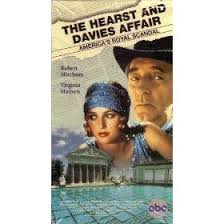
THE HEARST AND DAVIES AFFAIR
US, 1985, 98 minutes, Colour.
Robert Mitchum, Virginia Madsen, Fritz Weaver.
Directed by David Lowell Rich.
The Hearst and Davies Affair is a glossy telemovie focusing on the relationship between newspaper tycoon William Randolph Hearst and actress Marion Davies. Of course, movie-watchers' views of Hearst and Davies would be gleaned from Orson Welles' 1941 classic, Citizen Kane. Comparisons with this telemovie and Citizen Kane are, of course, very interesting.
This film is based on historical material. However, the treatment is for the widest possible television audience - something in the rather more sanitised Reader's Digest style. Virginia Madsen is attractive and believable as Marion Davies, giving a character to this rather enigmatic actress. Robert Mitchum is Hearst - but it is really Hearst as Robert Mitchum.
The period of the film is from 1916 to 1937. However, Hearst and Davies remained together until his death in 1951.
1.Entertaining telemovie? Historical background? Audience interest in Hearst, Marion Davies? The comparisons with Citizen Kane?
2.The re-creation of the period, World War One, the '20s and '30s? Affluence, the glamour of New York, the Ziegfeld Follies, movie-making? Newspaper production? Hearst's mansion of San Simeon? The musical score and the times?
3.The title and the focus, the two personalities, Hearst's marriage and the unwillingness of his wife to give a divorce? The long affair?
4.The framework and Hearst and his loss of money, Marion Davies' response? Her own wealth and giving it to him? The very brief ending with the information that Hearst remade his money?
5.Marion Davies, Ziegfeld girl, nervous and fluffing her line, encountering Hearst and his attraction? Her mother watching over her relationships? Her sister? Their bonds? Her relationship with the film-maker? The attraction to Hearst, going out with him? Falling in love? Her reaction to the marriage and the possibility of divorce? Riding the bike and getting the ride in the car, her encounter with Millicent Hearst? The set-up in the apartment? The relationship, Hearst's telling his wife the truth? The separation because of Hearst's ambitions to be president? His giving up these ambitions? Her going to the newspaper office, the party for his birthday? Her life in San Simeon? Lonely and isolated? The film-making, Hearst's interest and interventions? Her publicity, her public? The role of Louella Parsons and gossip? Hearst's absence and her flirtation with Charlie Chaplin - the incident in the lions' cage, the dinner, at home with him? The death of Thomas Ince on the yacht? The years passing, her giving her life for Hearst? Her drinking, her moments of bitterness at San Simeon? Yet her remaining with Hearst?
6.Robert Mitchum as Hearst, bringing his own style - and playing a man 20 years younger than Mitchum's actual age of 69 during production? His sense of superiority and self-confidence, his recounting his history, ousted from Harvard, his father's attitude towards him, papers and the Yellow Press, World War One and his opposition to Wilson, people calling him a Kraut-lover? His antagonistic attitudes towards the presidency? His work with his staff? The theatre, attraction to Marion, gallant towards her? The association, proper, the flirtation? Buying her the apartment? Installing her as his mistress? The incident in the car, the birthday party and his going home to his wife, their discussions and her refusal for the divorce? Presidential campaign, withdrawing, entering into films? His relationship with Marion - and the crisis with his going to New York, her relationship with Chaplin? The death on the boat? His relationship with Arthur and the finances, Arthur's prejudice towards Marion Davies? His needing money and her giving it to him?
7.Millicent Hearst, the marriage, the children, her hostility, refusing the divorce?
8.Arthur, the management of the finances, antagonism towards Marion? His snubbing her, Hearst's stance? The money failing? Marion shrewd in building up her own account?
9.The making of movies, the different styles, Marion adapting? Hearst's interventions? Louella Parsons and gossip? The portrait of Charlie Chaplin, affair, Chaplin's marriage?
10.The political background of the time, America and World War One, Wilson? The aftermath? Presidency, his relationship with Roosevelt? The publication of the papers, the Hearst press and his influence?
11.The background of Broadway, the Ziegfeld Follies, patronage by rich men? The relationship with Hollywood, movie-making?
12.Marion's mother, her watching over her daughter, wanting her to be married yet approving the relationship? Her sister? The party, the shooting - and the subsequent court case and Marion's withdrawing?
13.A sanitised glimpse into characters and their period?
Published in Movie Reviews
Published in
Movie Reviews
Tagged under